Related Research Articles

The Goon Show is a British radio comedy programme, originally produced and broadcast by the BBC Home Service from 1951 to 1960, with occasional repeats on the BBC Light Programme. The first series, broadcast from 28 May to 20 September 1951, was titled Crazy People; subsequent series had the title The Goon Show.
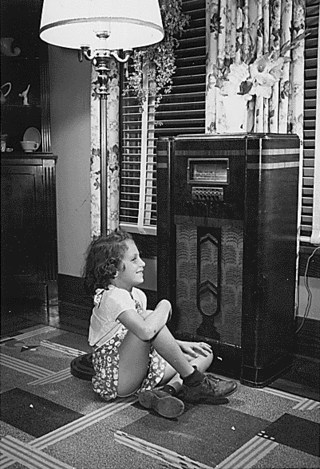
The Golden Age of Radio, also known as the old-time radio (OTR) era, was an era of radio in the United States where it was the dominant electronic home entertainment medium. It began with the birth of commercial radio broadcasting in the early 1920s and lasted through the 1950s, when television gradually superseded radio as the medium of choice for scripted programming, variety and dramatic shows.
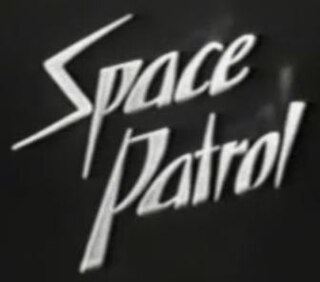
Space Patrol is an American science fiction adventure series set in the 30th century that was originally aimed at juvenile audiences via television, radio, and comic books. It was broadcast on ABC from March 1950 to February 1955. It soon developed a sizable adult audience, and by 1954 the program consistently ranked in the top 10 shows broadcast on a Saturday.
Broadcast syndication is the practice of leasing the right to broadcasting television shows and radio programs to multiple television stations and radio stations, without going through a broadcast network. It is common in the United States where broadcast programming is scheduled by television networks with local independent affiliates. Syndication is less widespread in the rest of the world, as most countries have centralized networks or television stations without local affiliates. Shows can be syndicated internationally, although this is less common.

Dimension X was an NBC radio program broadcast mostly on an unsponsored, sustaining basis from April 8, 1950, to September 29, 1951. The first 13 episodes were broadcast live, and the remainder were prerecorded. Fred Wiehe and Edward King were the directors, and Norman Rose was heard as both announcer and narrator, opening the show with: "Adventures in time and space... told [or transcribed] in future tense..." For two months, beginning on July 7, 1950, the series was sponsored by Wheaties.

X Minus One is an American half-hour science fiction radio drama series that was broadcast from April 24, 1955, to January 9, 1958, in various timeslots on NBC. Known for high production values in adapting stories from the leading American authors of the era, X Minus One has been described as one of the finest offerings of American radio drama and one of the best science fiction series in any medium.

The Quatermass Memoirs is a British radio drama-documentary, originally broadcast in 5 episodes on BBC Radio 3 in March 1996. Written by Nigel Kneale, it was born out of his Quatermass series of films and television serials, which had first been broadcast in the 1950s. The idea for the show appeared as BBC radio intended to create a season of programming looking back at the 1950s, and it was the final piece of writing Kneale completed relating to the character.
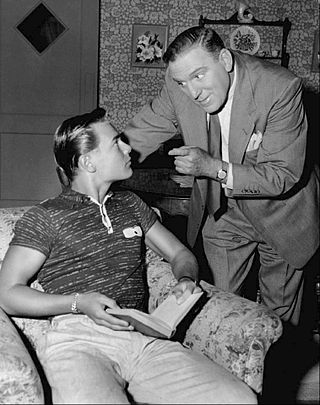
The Life of Riley is an American radio situation comedy series of the 1940s that was adapted into a 1949 feature film, a 1950s television series, and a 1958 comic book.
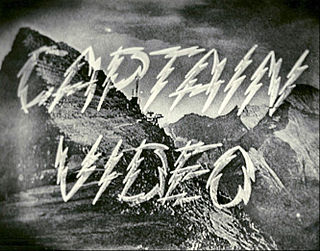
Captain Video and His Video Rangers is an American science fiction television series that aired on the DuMont Television Network and was the first series of its genre on American television.
Springbok Radio was a South African nationwide radio station that operated from 1950 to 1986.
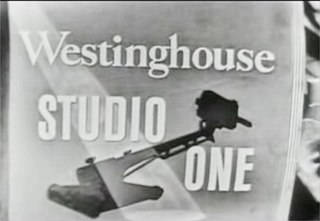
Studio One is an American anthology drama television series that was adapted from a radio series. It was created in 1947 by Canadian director Fletcher Markle, who came to CBS from the CBC. It premiered on November 7, 1948 and ended on September 29, 1958, with a total of 467 episodes over the course of 10 seasons.
"There Will Come Soft Rains" is a science fiction short story by author Ray Bradbury written as a chronicle about a lone house that stands intact in a California city that has otherwise been obliterated by a nuclear bomb, and then is destroyed in a fire caused by a windstorm. The title is from a 1918 poem of the same name by Sara Teasdale that was published during World War I and the Spanish flu pandemic. It was first published in 1950 in two different versions in two separate publications, a one-page short story in Collier's magazine and a chapter of the fix-up novel The Martian Chronicles.
Jerome Howard Doggett was an American sportscaster who called games for the Brooklyn and Los Angeles Dodgers of Major League Baseball from 1956 to 1987.

You Are There is a 1947–1957 American historical educational television and radio series broadcast over the CBS Radio and CBS Television networks.
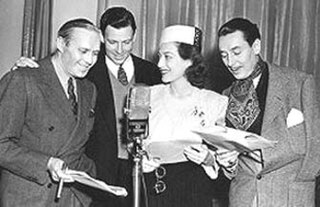
The Screen Guild Theater is a radio anthology series broadcast from 1939 until 1952 during the Golden Age of Radio. Leading Hollywood stars performed adaptations of popular motion pictures. Originating on CBS Radio, it aired under several different titles including The Gulf Screen Guild Show, The Gulf Screen Guild Theater, The Lady Esther Screen Guild Theater and The Camel Screen Guild Players. Fees that would ordinarily have been paid to the stars and studios were instead donated to the Motion Picture Relief Fund, and were used for the construction and maintenance of the Motion Picture Country House.

Nero Wolfe is a 1982 Canadian radio drama series adapted from the Nero Wolfe mysteries by Rex Stout. The series stars Mavor Moore as Nero Wolfe, and Don Francks as Wolfe's assistant Archie Goodwin. Thirteen hour-long episodes were presented by the Canadian Broadcasting Corporation.

Three Blind Mice is the name of a half-hour radio play written by Agatha Christie, which was later adapted into a television film, a short story, and a popular stage production.
Dangerous Assignment was an NBC Radio drama starring Brian Donlevy broadcast in the US 1949–1953, a syndicated television series distributed in the US 1951–52, and an Australian radio series broadcast in 1954-56 as remakes of the original American radio scripts.
The Saint was a radio adventure program in the United States that featured a character created by author Leslie Charteris. As the program's introduction said, The Saint, was "known to millions from books, magazines, and motion pictures." Several versions of the program appeared on different networks.

The Amazing Nero Wolfe is a 1945 American radio drama series starring Francis X. Bushman as Rex Stout's fictional armchair detective Nero Wolfe. Broadcast July 17–November 30, 1945, the series was created by the Don Lee Network, a California affiliate of the Mutual Broadcasting System, and may have been broadcast only in that region. The Amazing Nero Wolfe was based on Stout's principal characters but not his stories.
References
- ↑ Widner, James F. and Meade Frierson, III. Science Fiction on Radio: A Revised Look at 1950–1975. AFAB, 1996.